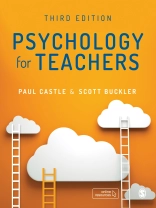How can ideas and concepts from psychology be applied smartly to the classroom to meet the needs of different learners? Supported by research and an awareness of the factors underpinning high-quality teaching, this book encourages teachers, and those training to teach, to examine their own methods in order to develop as confident, evidence-informed professionals.
This third edition includes:
· A new chapter on the psychology of elearning
· A new discussion of applied cognitive theories in the classroom
· The use of internationally friendly terminology throughout the book
· Some streamlining of content to offer a more cohesive reading experience
表中的内容
Part 1: Psychological perspectives on education
Chapter 1: Classical Learning Approaches within Psychology
Chapter 2: Contemporary Learning Approaches within Psychology
Chapter 3: The Effective Teacher
Chapter 4: The Philosophy and Psychology of Professional Practice
Part 2: The individual learner
Chapter 5: Neurological and Physical Development
Chapter 6: Perceptual and Cognitive Development
Chapter 7: Social, Emotional Development and Personality
Part 3: Meeting the needs of the learner
Chapter 8: Understanding the Self
Chapter 9: Understanding Special Educational Needs, Disabilities and Inclusion (SENDI)
Chapter 10: Motivation
Chapter 11: Integrating Psychology in the Classroom
Part 4: Mental health, wellbeing and resilience
Chapter 12: Mental Wellbeing
Chapter 13: Coaching Psychology and Developing Resilience
Part 5: Psychological skills training
Chapter 14: Goal-Setting
Chapter 15: Mental Imagery
Chapter 16: Self-Talk and Cognitive Restructuring
Chapter 17: Relaxation
Part 6: Evidence-based teaching
Chapter 18: Reading, Reasoning and Researching Education
Part 7: Classroom practice
Chapter 19: The Learning Environment
Chapter 20: Elearning: The New Frontier in Education
Chapter 21: The ‘Ideal’ Teacher
Chapter 22: Reflective Position: Integrating the Strands of this Book
关于作者
Scott Buckler has been involved in education since the 1990s, fluctuating between primary teaching, secondary teaching (science, computing, psychology), and universities (education, sport, psychology). From teaching research methods across the expanse of education (from the primary years through to doctorates), Scott has been an advocate of high quality research, through facilitating an open mind while maintaining academic integrity. His research has encompassed many areas, often with the theme of personal and professional growth, through the lens of transpersonal psychology. His Ph D thesis was interdisciplinary, combining anthropology and psychology to explore the way that the martial arts lead to personal transformation. Professionally, Scott’s research is predominantly in applied educational psychology, inclusive education, and research methods. Scott is a Chartered Teacher and Chartered Psychologist.












